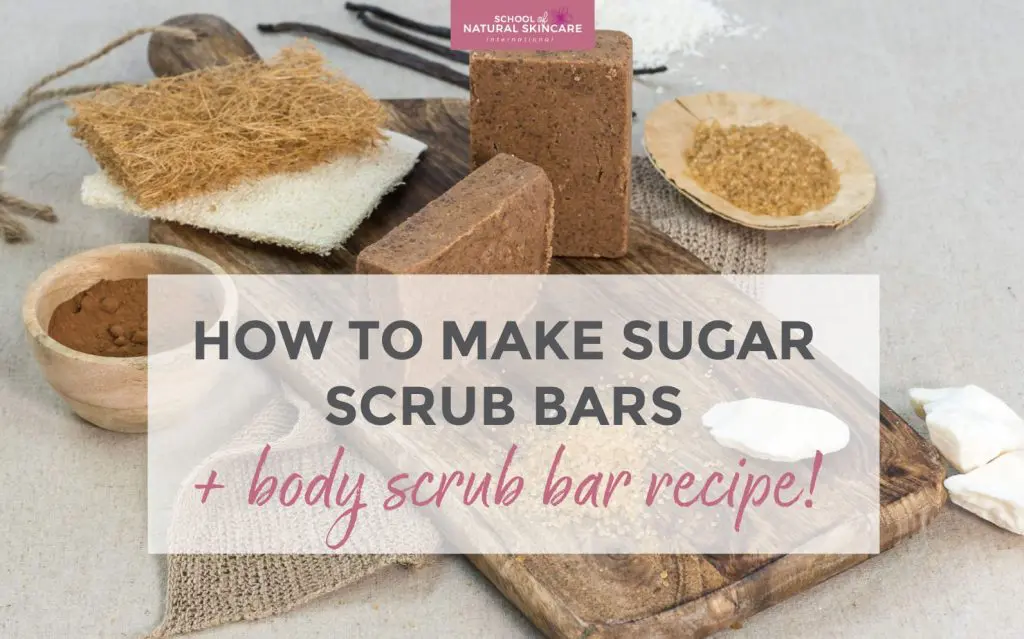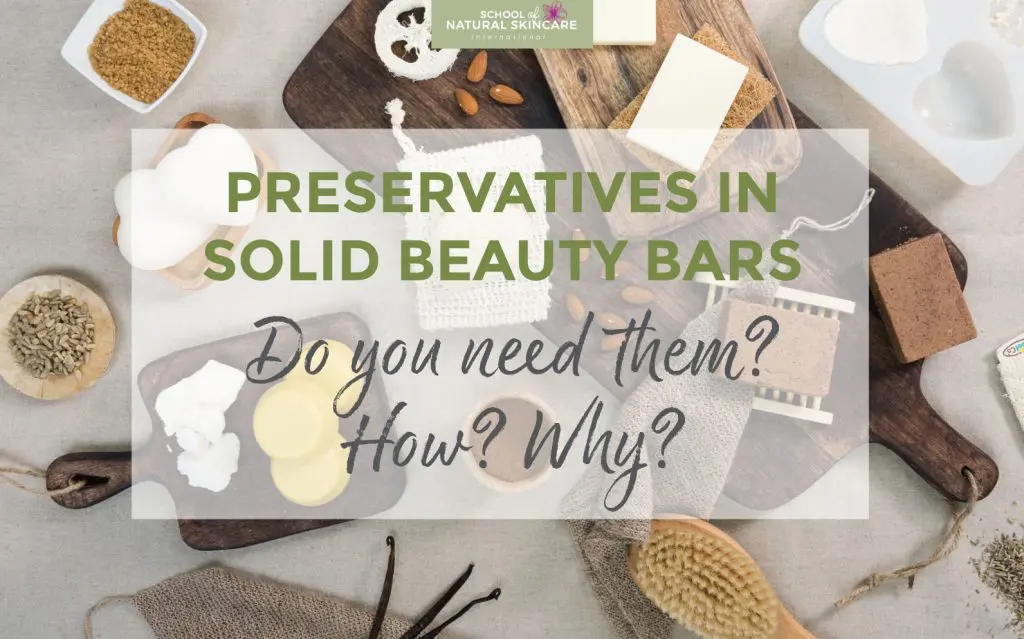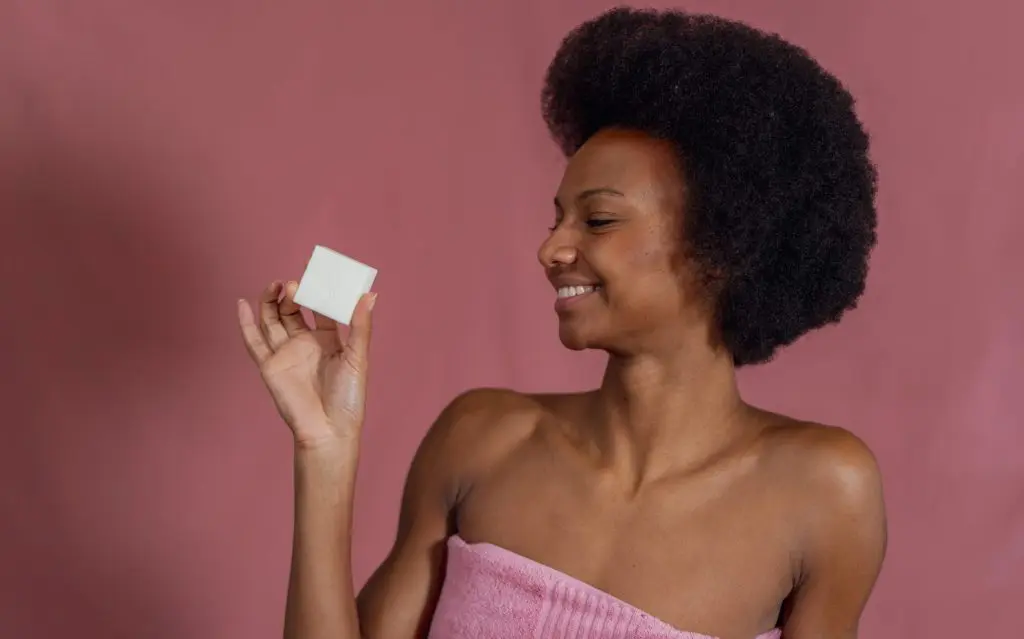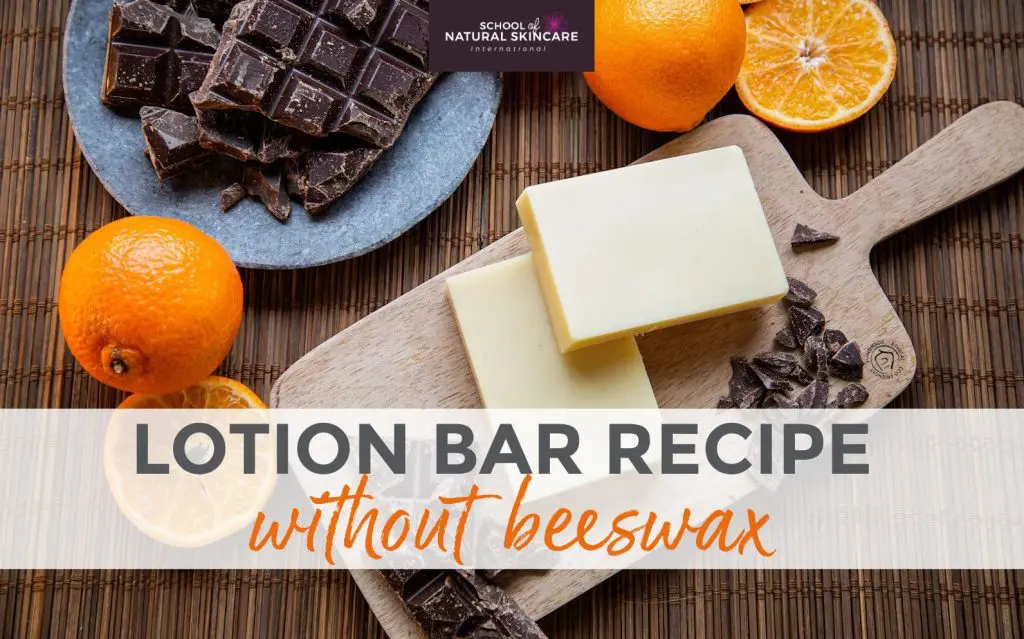Exfoliating sugar scrub bars are a wonderful kind of solid, zero waste skincare product! They can be formulated as body scrub bars or even facial scrub bars.
Body scrub bars don’t have to contain sugar, there are lots of other exfoliants to choose from too, though sugar scrub bars are a good place to start when making your own.
Body scrub bars were made popular by brands like LUSH with their iconic Buffy Body Scrub. Today we are going to share with you a super simple and effective sugar scrub bar recipe and step-by-step instructions for how to make body scrub bars at home for a fraction of the cost!

9 reasons to love exfoliating sugar scrub bars
- Their solid form means they don’t require any packaging, helping to reduce waste.
- Body scrub bars contain nourishing oils and butters to smooth, soften and moisturize the skin.
- The exfoliants, such as sugar, gently remove dead skin cells, and smooth and soften the skin.
- The oils in the bar melt away makeup, sunscreen and other oil soluble impurities from the skin.
- Scrub bars are easy and fun to make.
- The ingredients are easy to find.
- You can have fun substituting different oils, butters, exfoliants and essential oils, and creating bars in different shapes and sizes.
- You can vary the strength of exfoliation they provide by changing the type and/or amount of exfoliating particles used.
- Scrub bars can be used multiple times and are long lasting.

Cocoa and Vanilla Sugar Scrub Bar Recipe
This recipe is easy to make and smells incredible! It leaves skin super soft and wonderfully nourished.
Product development questions
Product type:
Solid anhydrous exfoliating bar.
Are you formulating to meet a particular standard or certification?
We are using naturally derived ingredients that are COSMOS-approved.
Who is your target audience?
People of all ages looking for a natural exfoliating product, particularly those interested in zero waste cosmetics.
What is the purpose/function of your product?
To gently exfoliate the dead skin cells from the top layer of the skin as well as leaving the skin feeling moisturized.
What properties and qualities do you want your product to have?
A solid brown-colored bar with a sweet scent that can be used multiple times. Gentle, yet effective exfoliant. Emollients to nourish the skin, leaving it feeling soft and smooth.
What type of packaging will your product go in?
No primary packaging is required as it is a solid bar. The product should be left to drain between uses on a rack or soap dish.
What physical exfoliants are you using and why?
Ground olive stone and brown sugar have been included as the combination of a small and large particle size creates effective exfoliation and looks attractive.
What emollients are you using and why?
Cocoa butter acts as a hardener to create a solid, bar format. It is also a very effective emollient.
Coconut oil provides softening and moisturizing properties to the formulation.
Shea butter contains a high amount of unsaponifiables, which provide moisturizing properties to this formulation.
What thickeners are you using and why?
Beeswax provides this product with its firm and solid properties as well as providing a protective, occlusive layer to the skin.
Cetyl alcohol is a fatty alcohol that helps to solidify the product and also provides moisturization to the skin.
What essential oils and extracts are you using and why?
Coconut CO2 extract and vanilla oleoresin to provide a sweet, tropical aroma.
What other ingredients are you using and why?
Cocoa powder as a gentle exfoliator and a colorant.
Even though the product is anhydrous, as it will come into regular contact with water we have included a COSMOS-approved preservative, Preservative Eco.
Vitamin E as an antioxidant.

Body scrub bar formula
| Phase | INCI name | Trade name | Function | w/w% |
| A | Theobroma Cacao (Cocoa) Seed Butter | Cocoa butter | Emollient | 50.3 |
| A | Cocos Nucifera (Coconut) Oil | Coconut oil | Emollient | 5.0 |
| A | Butyrospermum Parkii (Shea) Butter | Shea butter | Emollient | 6.0 |
| A | Cera Alba | Beeswax | Thickener | 10.0 |
| A | Cetyl Alcohol | Cetyl alcohol | Thickener | 3.5 |
| B | Tocopherol | Vitamin E (95% mixed tocopherols) | Antioxidant | 0.1 |
| B | Benzyl Alcohol (and) Salicylic Acid (and) Glycerin (and) Sorbic Acid | Preservative Eco | Preservative | 1.0 |
| B | Cocos Nucifera (Coconut) Pulp Extract | Coconut CO2 extract | Fragrance | 0.1 |
| B | Vanilla Planifolia (Vanilla) Fruit Oil | Vanilla oleoresin | Fragrance | 2.0 |
| B | Olea Europaea (Olive) Seed | Ground olive stone | Physical exfoliant | 10.0 |
| B | Sucrose | Brown sugar | Physical exfoliant | 10.0 |
| B | Theobroma Cacao (Cocoa) Powder | Cocoa powder | Colorant | 2.0 |

Body scrub bar recipe in grams and ounces
Professional cosmetic formulas are written in percentages as we have above. One of the benefits of writing a formula in percentages is that it’s very easy to make different batch sizes, and when we talk about a batch, we simply mean a quantity of your product. That could be large or small depending on how many individual products you want to make.
You can read our article on How to turn a cosmetic formula into a weight-based recipe if you’d like to know more.
If you are a beginner then you can follow this recipe for a 100g or 4oz batch.
| Phase | Trade name | Amount in grams for a 100g batch | Amount in ounces for a 4oz batch |
| A | Cocoa butter | 50.3 | 2.012 |
| A | Coconut oil | 5.0 | 0.2 |
| A | Shea butter | 6.0 | 0.24 |
| A | Beeswax | 10.0 | 0.4 |
| A | Cetyl alcohol | 3.5 | 0.14 |
| B | Vitamin E (95% mixed tocopherols) | 0.1 | 0.004 |
| B | Preservative Eco | 1.0 | 0.04 |
| B | Coconut CO2 extract | 0.1 | 0.004 |
| B | Vanilla oleoresin | 2.0 | 0.08 |
| B | Ground olive stone | 10.0 | 0.4 |
| B | Brown sugar | 10.0 | 0.4 |
| B | Cocoa powder | 2.0 | 0.08 |
How to make sugar scrub bars
Sugar scrub bars are really easy to make. Simply follow these four steps.
1. Mix together phase A ingredients and heat to 70°C until the solids are melted.

2. Cool down phase A to approximately 50°C, add each phase B ingredient in turn and stir well.

3. Pour the mixture into a mold. Leave to cool.

4. Once solidified, take the bars out of the mold.

Watch the video to see exactly how to make a sugar scrub bar.
Instructions for use
To exfoliate the skin, rub the bar against the body whilst in the shower and rinse off.
Troubleshooting and varying the sugar scrub bar formula
Troubleshooting
My bar is too soft
During summer or in hotter climates, the formula provided might turn out too soft. To solve this problem, you will need to increase the melting point of your product. You can do this by trying these options:
- Replace soft butters (like shea butter) with hard butters (like cocoa butter).
- Replace part or all of the liquid oils with a butter.
- Add a wax, for example beeswax or candelilla wax, to your formula (lower the amounts of soft or liquid ingredients appropriately). Start by adding 2-3% of wax and see what the result looks like.
My bar is too hard and does not readily melt
You may find your bar too hard for comfortable use, especially if you live in colder climates. You will need to adjust the formula to lower the melting point of your butter by doing one of the following options:
- Replace very hard butters (like cocoa butter) with a softer butter (like shea or mango butter).
- Replace part of the solid butters with liquid carrier oils. Start by reducing the amount of butters by 2% and increasing the amount of oils by 2%.
- If the formula contains waxes, lower their amount and increase the amount of liquid oils.
My exfoliating bar is too abrasive/not abrasive enough
The strength of exfoliation depends on the amount of exfoliating ingredients (eg salt, sugar, seeds, etc) and their size. For stronger exfoliation, add more exfoliant to the formula, or for less strong exfoliation, lower the percentage of exfoliant. For more gentle exfoliation, use smaller particles. You can also change the type of exfoliant to vary the strength of exfoliation, for example try using an exfoliant that doesn’t melt in water (like sugar does), such as ground olive stone.

Varying the formula
Include surfactants or emulsifiers
Surfactants or emulsifiers can be included to help the product rinse off more easily. As surfactants are water soluble only certain ones can be incorporated into a solid scrub bar. Learn more about which ones to use in our Diploma in Zero Waste Skincare and Haircare Formulation.
Increase or decrease the amount of exfoliants
Vary the strength of exfoliation by adding more or less exfoliant.
Swap the exfoliant(s)
Sugar and salt are popular exfoliants for scrub bars but you can also use a wide range of other exfoliants. Botanical seeds or shells are an eco-friendly option for plastic-free biodegradable exfoliants. Unlike salt and sugar, they do not melt in the water during use. This means that a smaller amount of exfoliant is needed. Common examples are ground coffee, ground walnut shells, ground apricot stones, bamboo powder, etc.
You can combine several different exfoliants in the same product, so have fun experimenting!
Change the oils and butters
Swap the oils and butters in the formula for other oils and butters. The options are endless!
Create a facial scrub bar
It may be surprising to hear that sugar can be suitable for a facial scrub, however even though it has rather large crystals, they melt in contact with water making them gentler. In our Diploma in Zero Waste Skincare and Haircare Formulation we share with you a gorgeous Warm Vanilla Solid Facial Scrub formula.
Visual appearance
You can change the appearance of your scrub bar by the exfoliants you use, the shape of the mold you use and the color of the ingredients you use.
Make your own complete range of beauty bars
Sugar scrub bars are just the start of what it’s possible to make in zero waste bar format!
Our brand new online Diploma in Zero Waste Skincare and Haircare Formulation teaches you to formulate a wide range of zero waste beauty bars including solid facial cleansers and exfoliators, solid moisturizers and serums, solid deodorant, solid shower products, solid shampoo and conditioner.
You’ll also formulate powder concentrates, and learn about ingredient innovations that are helping to reduce waste – upcycled ingredients and biofermentation.
We really hope you’ll join us for this exciting course!




